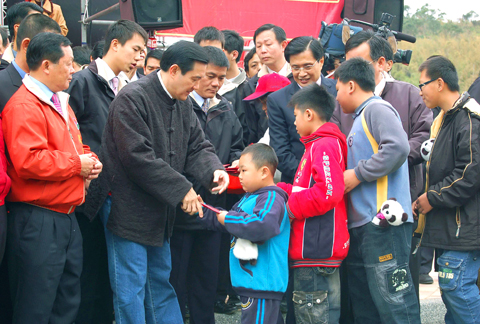More than 1,000 people crammed into Ma Village (馬家庄) in Miaoli County’s Tongsiao Township (通宵) yesterday, hoping to receive a lucky red envelope from President Ma Ying-jeou (馬英九), but the manner in which the eager crowd was ushered past the president caused some displeasure among those who had waited several hours to meet him.
In Mandarin, “Ma Village” literally means the “village of the Ma family.” However, while most of Ma Village’s residents are surnamed Ma, none of the Hong Kong-born president’s ancestors or relatives have ever lived there.
Guarded by 600 police officers, Ma spent less than two seconds with each person. To move the queue along, Ma’s staff would either personally shoo each person sway or use a loudspeaker to expedite the process.

PHOTO: FU CHAO-BIAO, TAIPEI TIMES
DISAPPOINTMENT
Many people who had been standing in line were left disappointed when the president left early to visit a local temple, leaving his staffers to finish handing out the rest of the envelopes.
One man said he had been waiting for more than 48 hours to be the first person to receive a red envelope from Ma.
“I didn’t even go home for the New Year’s Eve dinner. I sincerely believe being the first [to get a red envelope from the president] will bring me good luck throughout the coming year,” he said.
A mother with two young children said she felt she was lining up for food stamps rather than to meet the president, whom she said she had voted for.
EYE CONTACT
“He didn’t even bother to look into my eyes. Maybe he actually didn’t want to be there,” she said.
Seventy-three-year-old Miaoli farmer Wu Tung-ming (吳東民) said he was not at all interested in getting anywhere near the president, saying Ma was a showman rather than a statesman.
“This is nothing short of a theatrical performance. [Ma] is from China and Ma Village has been in Taiwan for more than a century. He has no business being here except to put on a show,” he said, adding that Ma should rather spend time thinking about how to revive the economy than being pampered by his supporters.
Although this was Ma’s first trip to the village as president, he has been paying regular visits there for the last 16 years.
TV news reports said the president had prepared 15,000 red envelopes for the visit, but only around 3,000 people showed up.
Democratic Progressive Party Taipei County Councilor Chen Chien-ming (陳建銘) said Ma was “impersonal” and “ungrateful.”
“The purpose of giving somebody a red envelope is to show the person he or she is important to you. But the way Ma did it seemed to be more a means of boosting his popularity than really thanking supporters for their valuable votes that had made his presidency possible,” the councilor said.
Chen Chien-ming said that, compared with former president Chen Shui-bian (陳水扁), who used to say a few words to each red envelope recipient and once even sat down to enjoy a bowl of soup with local residents, “Ma obviously does not care about people from the grassroots level.”
Ma has no other scheduled public events today or tomorrow.

A magnitude 7.0 earthquake struck off Yilan at 11:05pm yesterday, the Central Weather Administration (CWA) said. The epicenter was located at sea, about 32.3km east of Yilan County Hall, at a depth of 72.8km, CWA data showed There were no immediate reports of damage. The intensity of the quake, which gauges the actual effect of a seismic event, measured 4 in Yilan County area on Taiwan’s seven-tier intensity scale, the data showed. It measured 4 in other parts of eastern, northern and central Taiwan as well as Tainan, and 3 in Kaohsiung and Pingtung County, and 2 in Lienchiang and Penghu counties and 1

FOREIGN INTERFERENCE: Beijing would likely intensify public opinion warfare in next year’s local elections to prevent Lai from getting re-elected, the ‘Yomiuri Shimbun’ said Internal documents from a Chinese artificial intelligence (AI) company indicated that China has been using the technology to intervene in foreign elections, including propaganda targeting Taiwan’s local elections next year and presidential elections in 2028, a Japanese newspaper reported yesterday. The Institute of National Security of Vanderbilt University obtained nearly 400 pages of documents from GoLaxy, a company with ties to the Chinese government, and found evidence that it had apparently deployed sophisticated, AI-driven propaganda campaigns in Hong Kong and Taiwan to shape public opinion, the Yomiuri Shimbun reported. GoLaxy provides insights, situation analysis and public opinion-shaping technology by conducting network surveillance

Taiwan is gearing up to celebrate the New Year at events across the country, headlined by the annual countdown and Taipei 101 fireworks display at midnight. Many of the events are to be livesteamed online. See below for lineups and links: Taipei Taipei’s New Year’s Party 2026 is to begin at 7pm and run until 1am, with the theme “Sailing to the Future.” South Korean girl group KARA is headlining the concert at Taipei City Hall Plaza, with additional performances by Amber An (安心亞), Nick Chou (周湯豪), hip-hop trio Nine One One (玖壹壹), Bii (畢書盡), girl group Genblue (幻藍小熊) and more. The festivities are to

Auckland rang in 2026 with a downtown fireworks display launched from New Zealand’s tallest structure, Sky Tower, making it the first major city to greet the new year at a celebration dampened by rain, while crowds in Taipei braved the elements to watch Taipei 101’s display. South Pacific countries are the first to bid farewell to 2025. Clocks struck midnight in Auckland, with a population of 1.7 million, 18 hours before the famous ball was to drop in New York’s Times Square. The five-minute display involved 3,500 fireworks launched from the 240m Sky Tower. Smaller community events were canceled across New Zealand’s